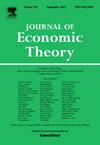说服大型投资者
IF 1.2
3区 经济学
Q3 ECONOMICS
引用次数: 0
摘要
监管者在设计公开压力测试以通过私人投资避免陷入困境的银行违约时,必须考虑到大型投资者对银行状况的私人信息。我们提供了挤入(挤出)的条件,这样监管者就能向信息更灵通的投资者提供内生的信息量更大(更小)的信号。我们的研究表明,只要投资者对公开消息保持敏感,并且他们的信息足够灵通,挤入就会发生:随着投资者的私人信息变得完全灵通,监管者的测试就会完美地揭示银行的状况。投资者从更精确的私人信号中获得的价值可能来自于它们对公共测试精确性的影响。本文章由计算机程序翻译,如有差异,请以英文原文为准。
Persuading large investors
A regulator who designs a public stress test to avert default of a distressed bank via private investment must account for large investors' private information on the bank's state. We provide conditions for crowding-in (crowding-out) so that the regulator offers an endogenous more (less) informative signal to better-informed investors. We show that crowding-in occurs as long as investors remain responsive to public news and they are sufficiently well informed: the regulator's test perfectly reveals the state as investors' become privately perfectly informed. Investors' value from more precise private signals may come from their effect on the public test's precision.
求助全文
通过发布文献求助,成功后即可免费获取论文全文。
去求助
来源期刊

Journal of Economic Theory
ECONOMICS-
CiteScore
2.50
自引率
12.50%
发文量
135
期刊介绍:
The Journal of Economic Theory publishes original research on economic theory and emphasizes the theoretical analysis of economic models, including the study of related mathematical techniques. JET is the leading journal in economic theory. It is also one of nine core journals in all of economics. Among these journals, the Journal of Economic Theory ranks fourth in impact-adjusted citations.
 求助内容:
求助内容: 应助结果提醒方式:
应助结果提醒方式:


